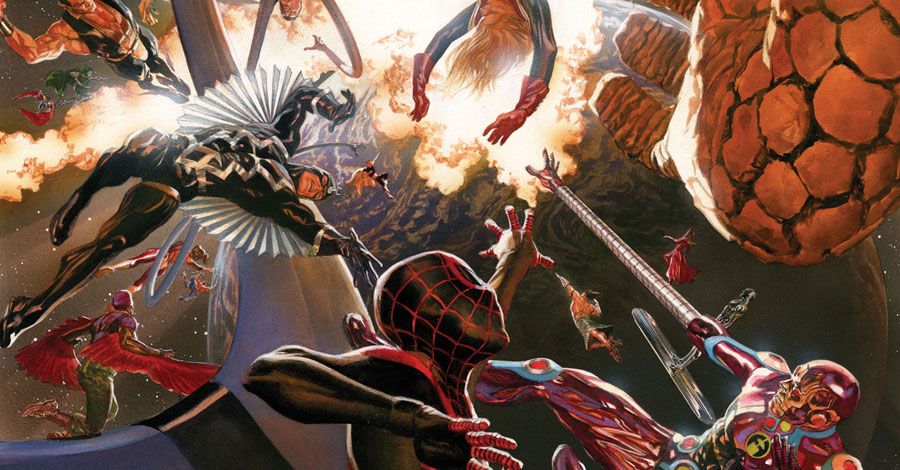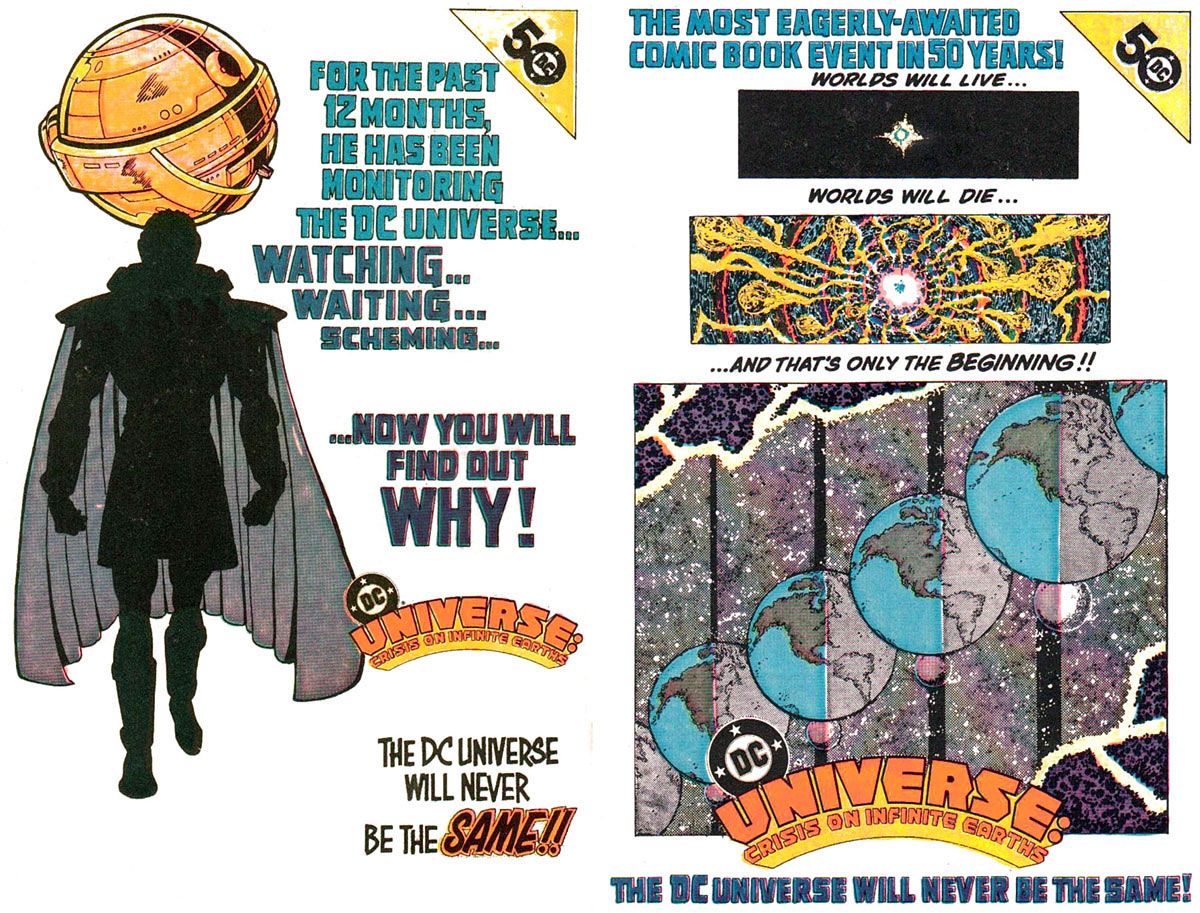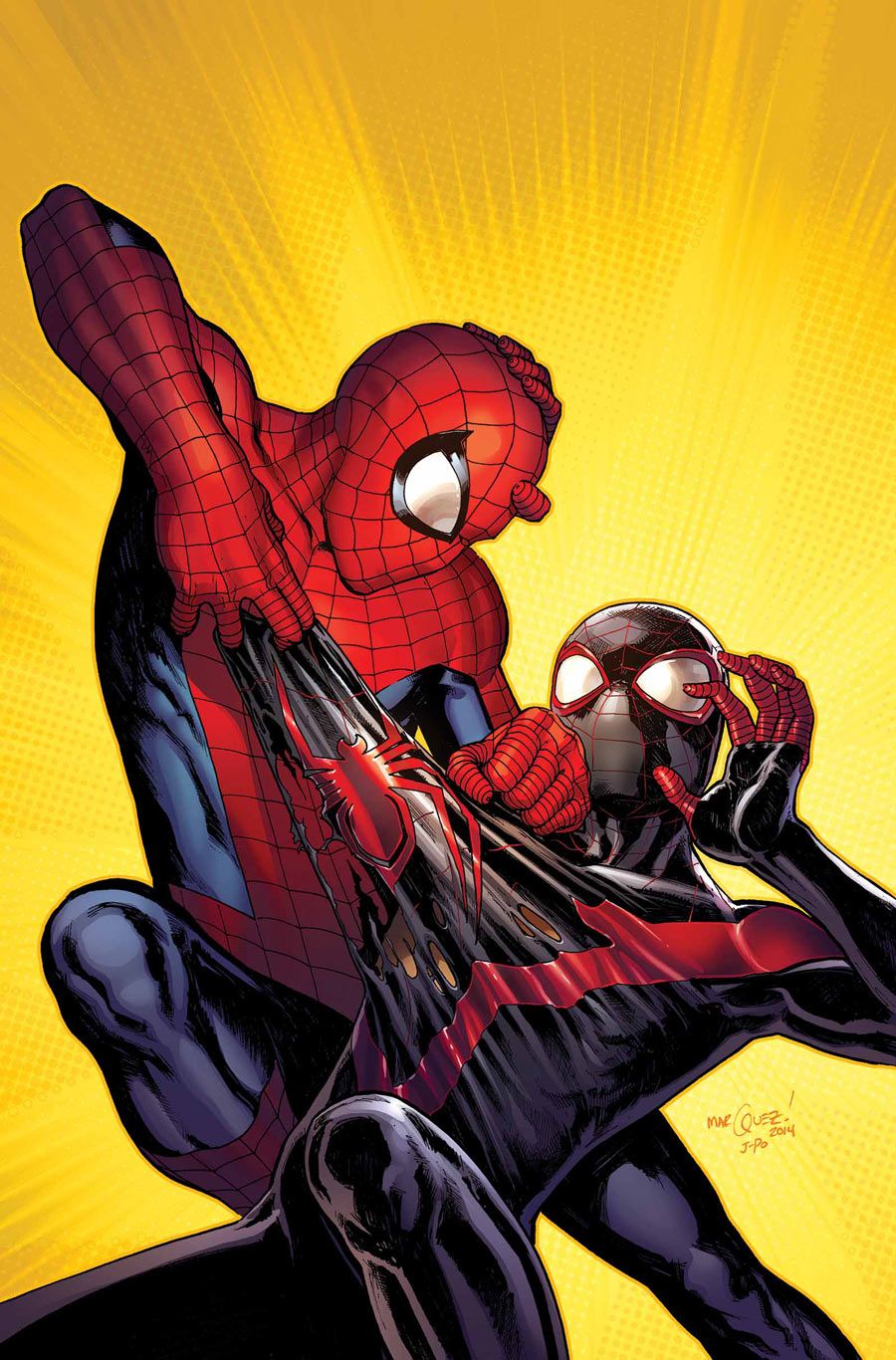"Things will never be the same!"
"Heroes will live, heroes will die!"
"The end is coming!"
Whenever a major event hits the Big Two comic book universes, phrases like these are bandied about. Typically, they end up being more bluster than promise, but sometimes, these words should be taken seriously. With Marvel heading into "Secret Wars," all signs point to readers being on the cusp of the latter, as the publisher has outright promised an event that will change the foundations of the Marvel Universe.
Over the decades, fandom has become a bit gun shy when it comes to reality-altering events, the term "reboot" brandished for every major change in story direction or continuity. Ever since DC Comics' last reboot, 2011's New 52 launch, resulted in a great initial swell of sales success, fans have been predicting, anticipating and even fearing a Marvel reboot as well. Now, with "Secret Wars" set to fundamentally alter the Marvel and Ultimate Universes, fans are taking to the blogosphere debating the pros and cons of the upcoming reality shaking event. While some fans directly accuse Marvel of copying DC, others express ennui over what they view as yet another reboot by a major company. However, while "Secret Wars" is obviously a deck clearing of sorts, a way to shake up the status quo of a 75 year old narrative universe, it is categorically not a reboot.
Marvel Universe and Ultimate Universe Set to Combine in "Secret Wars"
To prove this assertion, let's first look at past events that were undeniably reboots. The DC Universe following the events of "Crisis on Infinite Earths" was a full-on reboot. The universal structure of the shared universe was completely altered, with all of DC's myriad Earths being amalgamated into one super-Earth containing all of DC's Golden Age heroes and the heroes the publisher purchased from companies like Fawcett, Quality and Charlton. They now all lived in one reality, and all the stories that took place before the "Crisis" were now expunged from history. Those tales of yesteryear were delegated to back issue bins and memory. When a fan read the first issue of John Byrne's "Man of Steel," or the first issue of Frank Miller's "Batman: Year One," those issues were the first adventures of these post-"Crisis" heroes. DC's icons were suddenly without the benefit or baggage of fifty years of history.
With a few cosmetic alterations and even fewer exceptions, the same holds true for DC's New 52. After "Flashpoint," all the DC titles started from square one, without many threads or references to what came before. Some titles, like the "Batman" family of books and "Green Lantern," carried over many of the same story beats (both titles were big hits at the time of the reboot), but other books, like "Superman" and "Wonder Woman," were free of the constraints of the previous continuity. Virtually no threads remained + the narrative continuity beginning anew = reboot.
Jonathan Hickman's "Secret Wars," however, does not seem to be going down the same path as DC's reboots. The characters entering into this new era constructed of bits and pieces of many Marvel Universe realities are entering the fray with their narrative histories intact. It's the universe under the characters' feet that is changing, not the characters themselves. When the smoke clears, it seems that the Spider-Man that fans have been thrilling to all these years will be the same Spider-Man that enters the Battleworld of "Secret Wars." The same Peter Parker that has fought Green Goblins, that was replaced by Doctor Octopus, that was a victim of "Kraven's Last Hunt" and that lost Gwen Stacy will be the same Spider-Man fighting the good fight post-"Secret Wars." The world Spider-Man lives in will be vastly different, but Spidey will still be Spidey. Hence, no reboot.
The big question to ask, then, is will this new universe please fans? While there is most certainly going to be a contingent of readers who will be unhappy with the revamped status quo, if the post-"Secret Wars" Marvel Universe consists of quality writers working on compelling tales, the cosmic make up of the universe matters very little. If a comic like Matt Fraction and David Aja's "Hawkeye" or Mark Waid and Chris Samnee's "Daredevil" had taken place in a newly formatted Marvel Universe, would it have had any effect on the quality of the stories?
Alonso, Brevoort Discuss Universe-Melding "Secret Wars," Address the Reboot Question
Therein lies the key. A true reboot changes characters. Histories, timelines, relationships, costumes -- all of this altered by a hard reboot. At this point, Marvel's event appears to be a reboot of setting, so the House of Ideas can construct a clearer home base for its characters. What that setting will look like after it is all said and done is anyone's guess, but the characters will still be familiar to their fans. They may be in different configurations, and the rules of metafiction that make up the Marvel Universe may be different, but the reason we all plunk down our cash, the characters that sprang from the minds of Stan Lee and Jack Kirby, will maintain their identities. Do you really think Marvel will disrupt the development of the fan-favorite "Ms. Marvel" and start over from whole cloth? Of course not. Hence, it's not a reboot.
Let's go back to the "Crisis on Infinite Earths" example. While the death of the Kara Zor-El version of Supergirl was a major story point, by the time "Crisis" was over, no one remembered her. She was erased from history. In "Crisis," DC established the idea of a selective reboot. Kara was gone and forgotten, but the Crisis' other legendary casualty, Barry Allen, was still an integral part of the Flash mythos. Barry was dead, and nary an issue of the new "Flash" comic went by where Wally West didn't evoke the name of his mentor. But all those stories featuring the JLA teaming with the JSA, or Superboy being the inspiration for the Legion of Super Heroes! They were all gone.
The New 52 completely erased DC's Golden Age history, the coming of the superhero now heralded by the arrival of Superman. All those Geoff Johns "JSA" stories were now gone, and something else was in their place. Marvel does not seem to be doing that with "Secret Wars." Captain America will still have fought with the Invaders in World War II, the Kree/Skrull War will still have taken place and all those touchstone Marvel moments will still have happened. Or at least, we think they will have. What makes this not a reboot is the characters' awareness of the changes in their shared universe and the fact that no reset switch is being hit.
Even if, after reading the above arguments, you still insist that "Secret Wars" sounds like a reboot, consider that we constantly experience mini reboots with Marvel and DC, on a regular basis. Every ten years or so, both companies seem to change, with heroes changing appearance and voice even while existing in the same continuity. Wasn't the first issue of Grant Morrison's "New X-Men" fundamentally different from anything that came before? Didn't the Beast change appearance without a real story explanation, and didn't the characters in the book talk differently than just a month previous? Let's face it, constant reboots happen in comics all the time just to reset timelines. When the Fantastic Four was first introduced, Reed Richards and Ben Grimm were both veterans of World War II. There was never an in-story explanation years later why the two men were all of a sudden not WWII vets. Fans just chalked it up to Marvel's moving time scale, itself a constant reboot tool. Peter Parker, even though he is the "same" Peter Parker introduced by Stan Lee and Steve Ditko, never went to sock hops and never went to high school in a pre-Vietnam War era, because if he did, the web-slinging hero would be pushing seventy. We accept that Peter gained his Spider powers in some kind of amorphous time line, maybe about ten years ago, and in those ten years, all the adventures we are familiar with took place. The only character that stays of his era is Captain America, who will always be part of the Greatest Generation, but the day he was defrosted, that continues to change, with no in-story explanation. It just is.
With "Secret Wars," Marvel is set to make a boat load of these little resets, the same ones that keep our icons young. But this time, instead of a time shift happening almost imperceptibly, Marvel is marketing and branding them by placing the very familiar and very marketable "Secret Wars" label on all of it to hopefully drive people into the comic shops come May. In one massive move, Marvel will be able to re-align characters they feel need a fresh coat of paint. It's a way to market the Marvel Universe arrival of Miles Morales and have him play a major role with Marvel's other famous icons, and it's a way to do the unthinkable by killing, eliminating, resetting or reviving characters as Marvel sees fit, but through it all, the timeline that began in "Fantastic Four" #1 will still remain the basis of the Marvel Universe. We don't know what we will be left with when "Secret Wars" ends, but fans should be able to rest easy knowing that while the setting of the new Marvel Universe may be a very different one, "Secret Wars" is not a reboot. It's something new and exciting and daring, and maybe, depending on how well Marvel pulls it off, it can prove to be legendary.



